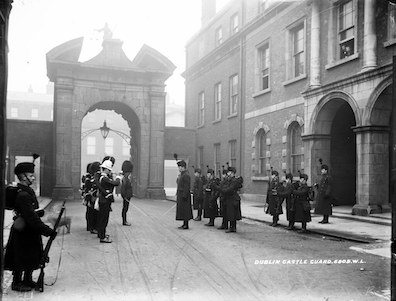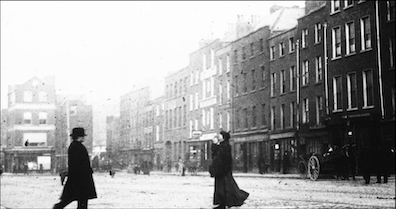Early in that story, Power sees Tom Kernan home after he
falls down the steps to a pub lavatory and bites off part of
his tongue:
Mr Power, a much younger man, was employed in the
Royal Irish Constabulary Office in Dublin Castle. The arc of
his social rise intersected the arc of his friend's decline
but Mr Kernan's decline was mitigated by the fact that certain
of those friends who had known him at his highest point of
success still esteemed him as a character. Mr Power was one of
these friends. His inexplicable debts were a byword in his
circle; he was a debonair young man.
The Royal Irish Constabulary was a quasi-military armed police
force separate from the unarmed Dublin Metropolitan Police.
Headquartered in Dublin Castle, the center of British power in
Ireland, its mission was to investigate and suppress nationalist
dissent. Vivien Igoe has discovered a DMP pensioner named John
Power, 39 years old in 1904, whose father Pierce Power had
worked in the RIC. Her claim for regarding this man as a model
for Joyce's character is strongly supported by a sentence in
Lestrygonians
when Bloom is thinking about nationalist dissent and state
crackdowns: "
Jack Power could a tale unfold: father a G man."
The reference is to armed plainclothes officers in the G
division of DMP who infiltrated IRA networks.
If Joyce drew on some knowledge of the Powers to create his
character, he probably did so in part because the surname suited
the occupation. (One can imagine the serendipity impressing him
enough that he resolved to clear space by changing the names of
the Fenian sympathizers John Wyse Power and
his wife
Jennie to "Nolan.") The involvement of his "Mr Power" in
imperial governance would explain "The arc of his social rise,"
and it may also account for some of the character's
corresponding personal qualities. While "Grace" implies some
human warmth or good nature in Mr. Power's continued friendship
with a man sliding down the path to alcoholic ruin, it also
notes his investment in ascendant respectability. Sitting at Mr.
Kernan's kitchen table, he is taken aback by the low-class
manners and accents of the man's three children "and his brow
grew thoughtful." Later in the story, when he returns at the
head of a delegation to "make a new man of" Kernan, M'Coy calls
him "Jack" and the reader learns that "Mr Power did not relish
the use of his Christian name."
These details feel consistent with some aspects of the man's
behavior in
Hades, where he is called "Mr Power" 42
times and addressed only once, by Simon Dedalus, as "Jack."
Power scorns the quality of the carriage the four men take to
the cemetery ("Corny might have given us a more commodious
yoke"), he readily indulges in antisemitic ridicule of Reuben J.
Dodd ("In all his pristine beauty"), and he enthusiastically
condemns suicide ("The greatest disgrace to have in the
family"). Such behaviors might well comport with the sense of
privilege felt by a young man on the rise in the Castle, and it
is tempting to suppose that Joyce was thinking of the Powers
when he gave his Mr. Power these attributes.
His main inspiration for the character never worked in the
Castle, however. Tom Devin, a good friend of John Stanislaus
Joyce (hence perhaps the fact that only Simon Dedalus calls him
"Jack"), was a less exalted bureaucrat, working first for the
Corporation
in City Hall and later, after a run-in with some higher-ups, for
its Cleansing Department in Wood Quay. John Wyse Jackson and
Peter Costello, John Joyce's biographers, mention cronies "like
Tom Devin and George Lidwell––decent chaps who liked a drink"
(185). They describe Devin as "clubbable" (243), "a ladies' man"
(271), a great borrower of money (287, 308), and "A decent,
kindly man" (431). Kernan's fall down the lavatory stairs, they
note, actually happened to John Joyce, and it was Devin who
saved him from being arrested by the police and took him home
(199). Devin remained friends with John Joyce until the latter's
death in 1931, and also with James Joyce until his own death in
1937. He got on well with Nora, and the younger Joyce lent him
money on various occasions. He was married twice.
Ellmann describes Devin as a "hearty man with a knack for
playing the piano" who often visited the Joyces when they lived
at the Martello Terrace seaside house in Bray (24). Apparently
he lived nearby. In 1934 Joyce wrote to Alf Bergan, another
regular visitor at these musical gatherings, "We used to have
merry evenings in our house, used we not?" Slote observes that
Stanislaus Joyce disliked Devin, saying that he was "known to be
still a consummate whore" (
Complete Dublin Diary, 82),
but his brother felt nothing of the kind. Ellmann reproduces
another letter that Joyce wrote to Alf Bergan on 25 May 1937,
saying, in part:
I am so sorry to hear your bad news that our old
friend Mr Devin is gone. Only on Wednesday last I gave his
name to a young American writer who is doing my biography and
has gone to Dublin, Mr Herbert Gorman. I told him to see you
and Mr Devin as you were the only people still left (as I
thought) who could remember all the pleasant nights we used to
have singing.... He used to collapse with laughter after a
preliminary scream in a high tone at certain sallies of my
father's. He must have been a fine looking fellow when he was
young and he had charming manners. He comes into Ulysses
under the name of 'Mr Power' and also into 'Dubliners.'
(704-5)
Some of the qualities displayed by "Mr Power" feel slightly
discordant with Devin's hearty good cheer, kindness, and freedom
with the ladies. When Joyce wrote that Devin "comes into" those
fictions "under the name" of that character, might he have
meant, not that Power was a mere pseudonym for Devin, but that
the qualities of two different men merged under the one name?
If Joyce did indeed add to his mental image of Tom Devin some
details associated with another man, that would help explain the
odd fact that in
Ulysses he also inserted a separate
trace of his friend under his own name, albeit misspelled. In
Wandering
Rocks the viceregal cavalcade passes by the offices of the
Cleansing Department: "From its sluice
in Wood quay wall
under Tom Devan's office Poddle river hung out in fealty a
tongue of liquid sewage." Joyce's decision to feature the Wood
Quay wall in this way (and here again he
altered
historical actuality to put the Poddle River outlet in
that spot) may conceivably have been meant as a kind of apology
to Tom Devin for combining him with the imperial servant "Mr
Power." There is nothing clean about that stream of sewage––far
from whitewashing British power in Ireland, the Cleansing office
seems to deride it.
Mr. Power figures in Cyclops as one of the men who
pull up to Kiernan's pub in the "castle car," emphasizing his
connections to state power. Penelope supplies
personal qualities more clearly derived from Tom Devin. Molly
thinks of a handsome middle-aged man who keeps a mistress on
the side and consorts with other unreliable
hail-fellow-well-met types: "they call that friendship killing
and then burying one another and they all with their wives and
families at home more especially Jack Power keeping that
barmaid he does of course his wife is always sick or
going to be sick or just getting better of it and hes
a goodlooking man still though hes getting a bit grey over
the ears theyre a nice lot all of them well theyre not
going to get my husband again into their clutches if I can
help it making fun of him then behind his back I know well
when he goes on with his idiotics because he has sense enough
not to squander every penny piece he earns down their gullets
and looks after his wife and family goodfornothings."



